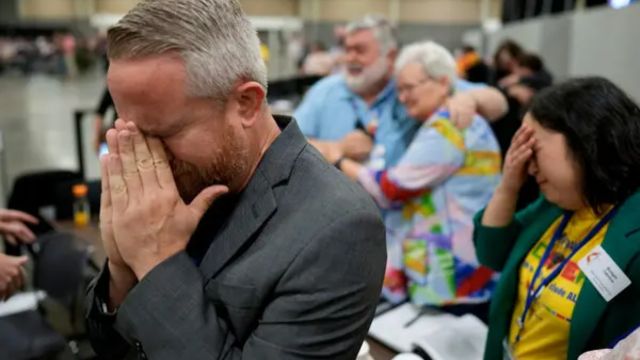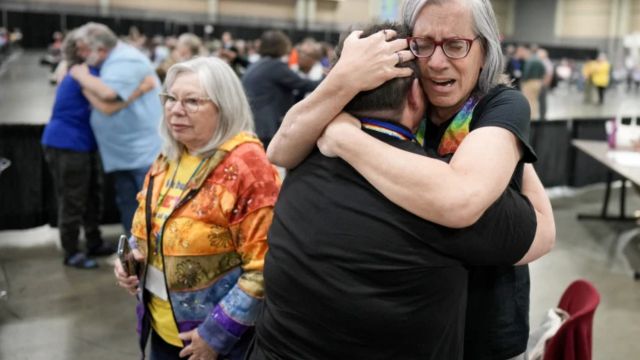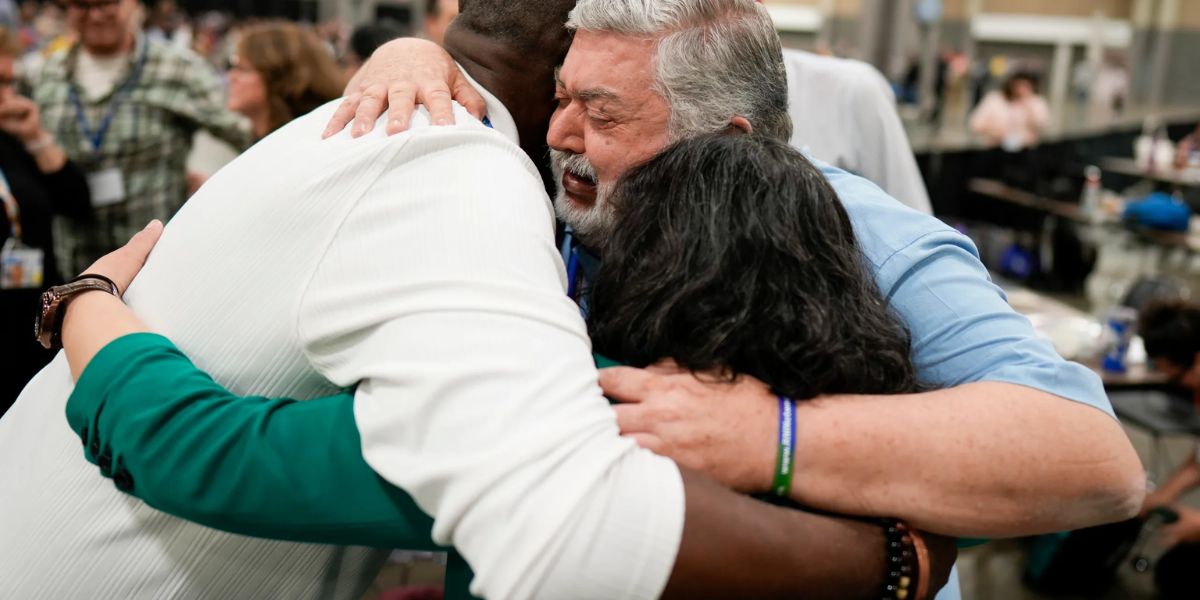‘BIG Breaking News?’ United Methodists End Decades-Long Ban On LGBTQ Clergy
CHARLOTTE, N.C. – Without a vote, United Methodist delegates on Wednesday overturned the church’s long-standing prohibition against LGBTQ clergy, eliminating a clause that prohibited “self-avowed practicing homosexuals” from receiving ordination or appointment as ministers.
At their General Conference, which was the first such legislative assembly in five years, delegates voted 692-51. The decades-long debate surrounding the matter stands in stark contrast to that overwhelming margin.
After much discussion and opposition, previous United Methodist General Conferences had gradually strengthened the ban and associated sanctions. However, a significant number of conservative members who had supported the ban have since left the denomination, and this General Conference has taken a firmly progressive stance.
Parts of the conference hall erupted in applause on Wednesday following the vote. Several LGBTQ advocacy group witnesses gave each other hugs, some of them sobbing. “Glory to God,” exclaimed one.

Although the church no longer forbids LGBTQ clergy, the amendment does not openly affirm or mandate them. Since United Methodist bodies in other nations, such as those in Africa, have the authority to set the regulations for their territories, it’s probable that the move will mostly affect churches in the United States. The measure becomes operative soon after Friday’s General Conference ends.
The majority agreement was so great that it was combined into a “consent calendar,” a collection of generally uncontroversial actions.
Related To – Alabama Senate Approves “DON’T SAY GAY” Bill Restricting LGBTQ+ Symbols in Schools
Bishop Karen Oliveto, the first openly lesbian bishop in the United Methodist Church, said, “It seemed like such a simple vote, but it carried so much weight and power, as 50 years of restricting the Holy Spirit’s call on people’s lives has been lifted.”
“People in the Mountain Sky Episcopal Area—which encompasses Colorado, Montana, Utah, and Wyoming—can live fully into their call without fear,” stated Oliveto. “We have found a home in the church we have loved.”
A bill prohibiting district superintendents, or regional administrators, from punishing clergy for executing a same-sex wedding or for refusing to do one was also approved. Superintendents are likewise prohibited from ordering or prohibiting a church to host a same-sex wedding.
With this action, the barriers surrounding the numerous LGBTQ prohibitions that have been ingrained in official church law and policy are further removed. Delegates started doing this on Tuesday.

Soon, delegates will also vote on whether to replace the current official Social Principles with a new document that defines marriage as between “two people of faith” rather than between a man and a woman and no longer refers to the “practice of homosexuality… incompatible with Christian teaching.”
In a denomination where LGBTQ concerns have been discussed in its General Conferences, which have been held every four years, for over fifty years, the developments are significant. Delegates decided on Tuesday to lift their denomination’s prohibitions on sponsoring gay-friendly ministries and evaluating LGBTQ candidates for ministry, as well as the mandatory fines associated with executing same-sex marriages.
Related To – LGBTQ Advocates Challenge Ohio Bill on Disclosing Students’ Sexual Orientation
Following the vote, over 100 LGBTQ individuals and allies gathered outside the Charlotte Convention Center to celebrate, pray, and sing praise songs to the sound of a drum. Many of them were wearing rainbow-colored scarves and umbrellas.
Six times, Angie Cox, an Ohio observer at the convention, went before the board of ordained ministry for her conference, but each time she was “told no just because of the prohibition on LGBTQ clergy.” The vote on Wednesday, according to her, “means I might be able to live fully into my calling.”
The vote, according to Pittsburgh delegate Tracy Merrick, who has long pushed for LGBTQ inclusion at conferences, allows the church to become “the denomination that many of us had envisioned for years.” She expressed her emotions in her statement.
The vote coincides with the departure of around 7,600 American congregations, or 25% of all UMC congregations in the country. The withdrawals, which occurred between 2019 and 2023, were a reflection of conservative outrage that the organization was not upholding its prohibitions against LGBTQ ordination and same-sex marriage. The disaffiliations took place during a brief period that allowed congregations to maintain their properties in rather advantageous conditions.
Against the appeals of conservatives who wanted the window to be extended—especially since the original window only applied to U.S. churches and not churches abroad—the conference voted on Wednesday to formally close it.
The Rev. Jerry Kulah, a delegate from Liberia, stated, “To limit its function to the United States (portion of the) United Methodist Church, that is a form of disfavor for the church in Africa.”
Delegate Dixie Brewster, representing Kansas and Nebraska for the Great Plains Conference, demanded a smooth disaffiliation process for her fellow conservatives. She remarked, “We want a place to go that is peaceful.” “We won’t cause any trouble. I adore everyone, including my gay pals. I just have a different perspective on the Scriptures.
Others, however, said that families and congregations were shattered by the recent process of disaffiliation.
“We cannot keep elevating the voices of mistrust,” Northern Illinois delegate Lonnie Chafin stated.
While some claim this is unduly burdensome, others drew attention to the fact that congregations and conferences as a whole can still disaffiliate, pointing out that the General Conference last week accepted the withdrawal of certain churches in the former Soviet Union.
The votes this week may lead to the departure of some foreign churches, especially in Africa, where there is a greater prevalence of traditional sexual views and where it is illegal in some states for same-sex relationships.
The conference last week approved a regionalization proposal that would grant American congregations the same degree of autonomy as other parts of the worldwide church. This amendment, which still needs to be ratified locally, may lead to a situation in which same-sex marriage and LGBTQ clergy are legal in the US but not in other countries.
Homosexuality is “incompatible with Christian teaching,” according to a statement authorized by the church’s General Conference in 1972. This same wording has been removed from a version of the Social Principles that is also scheduled for conference voting this week.
The conference also voted to mandate “fidelity in marriage and celibacy in singleness” in 1984, which led to the now-repealed prohibition on clergy who are “self-avowed practicing homosexuals.”
With a presence in nearly every county, the denomination was, until recently, the third largest in the US. But if the 2023 departures are taken into account, its 5.4 million U.S. members in 2022 are anticipated to decline.
Although prior figures have been higher, the denomination also has 4.6 million members in other nations, primarily in Africa.











